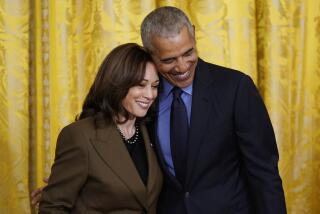Gore Suspends Campaign but Keeps Delegates
- Share via
WASHINGTON — Sen. Albert Gore Jr., predicting “there will be other days for me and the causes that matter to us,” suspended his presidential campaign Thursday and promised to work vigorously for his party’s ultimate nominee.
“The nominee is going to be Michael Dukakis or Jesse Jackson,” he said. “I’m going to do everything I can to help them do what I set out to do, and that is to put a Democrat in the White House.”
Gore said his decision to suspend rather than end his campaign will not affect the balance of the race. All but 78 of his 423 delegates, he explained, could have gone to the convention under either circumstance and voted for whomever they chose. However, if he had officially withdrawn from the race, the remainder would have been blocked from attending and their spots would have been allocated roughly evenly between Jackson and Dukakis.
Decision No Surprise
Gore’s announcement came as no surprise after his distant third-place finish in Tuesday’s New York primary, the latest in a string of defeats.
Nonetheless, by defying conventional wisdom, Gore outlasted most of his opponents. Instead of joining the traditional winter campaign march through the snows of Iowa and New Hampshire, Gore concentrated on his native South, where he won an impressive six primaries on March 8.
Super Tuesday, however, would effectively prove to be both the beginning and the end of his campaign.
Toward the end of his 10-month quest for the nomination, the 40-year-old Tennessee senator made headlines by attacking his Democratic rivals, irking many who saw his tactics as divisive.
His exit, however, was a graceful one, in which he credited his opponents with teaching him important lessons. Particularly eloquent was his tribute to the Rev. Jackson.
Just last month, Gore had dismissed Jackson’s candidacy with an offhanded barb: “We’re not choosing a preacher; we’re choosing a President.” But Gore acknowledged Thursday that “my friend Jesse Jackson” taught him that “a successful President must be both a chief executive and a preacher.”
Lacked Clear Message
In stark contrast to Jackson’s campaign, Gore’s was marked by a failure to develop a clear, compelling message. Instead of sharpening, Gore’s identity blurred as his presidential campaign progressed.
The youngest candidate in the race had tried, rather incongruously, to sell himself as the most experienced. In the South, he emphasized positions that made him appear conservative; in the North, he seemed moderate to liberal. And even as he suffered defeat after defeat at the hands of Jackson and Dukakis, Gore continued to make the argument that he was more electable than they.
As Dukakis and Jackson refrained from directly criticizing each other, Gore eagerly drew direct and unflattering comparisons.
Voice for Arms Control
Gore said his opponents had virtually no experience in foreign policy, for example, while he had become one of Congress’ leading voices on arms control during his dozen years in Congress.
The most centrist of the three, Gore repeatedly reminded Democratic crowds that their party had lost four of the last five elections.
“Are we going to pretend the American people are not saying something to the Democratic Party?” he asked. “We ignore that message at our peril.”
Both Dukakis and Jackson appeared ready to accept Gore’s offer of working to restore party unity.
Jackson, who has been sharply critical of Illinois Sen. Paul Simon’s decision to suspend his candidacy and hold his delegates, was notably temperate Thursday in reacting to Gore’s decision to follow the same course.
‘A Judgment to Make’
“In some sense, when the race is over and you’ve stopped running, you should declare that,” he said early in the day in Williamsport, Pa. “But that’s a judgment for Paul Simon and Al Gore to make.”
But he said later at a news conference in Erie that both Gore and Simon had told him that their decisions were based in part on the belief that a pullout “would be used as a stampede at this point of their delegates toward Dukakis, perhaps.”
At a press conference at Logan airport in Boston, Dukakis had only praise for Gore.
“There’s no question he’s very strongly committed to a Democratic victory in the fall,” Dukakis said. “He made it very clear to me that if I win this nomination he’s going to be out ther1696626543him well and congratulate him on a long, hard, good fight.”
On Turning 40
Although Gore’s impressive finish on Super Tuesday propelled him into the top tier of Democratic contenders, it was not enough to carry his campaign north. Gore joked Thursday: “I was doing great until I turned 40,” a birthday he celebrated during the height of his campaign in New York.
But in an interview last week, Gore expressed disappointment that Super Tuesday did not give his candidacy “the bounce” he had expected.
His heretofore unblemished record on civil rights may have been marred by his role in fanning the racial tensions surrounding the New York primary. His most prominent backer there, Mayor Edward I. Koch, alienated many in the black community with his denunciations of Jackson.
Even Koch has acknowledged that his support--initially thought to have given Gore’s candidacy a boost--was instead a liability. Rep. Thomas J. Downey (D-N.Y.), Gore’s New York chairman, said the senator must now concentrate on “mending fences” with blacks.
He also may have to smooth relations with some of his colleagues in the Senate. In trying to win New York’s huge Jewish vote, Gore chastised the 30 senators who signed a letter critical of Israeli Prime Minister Yitzhak Shamir for refusing to consider Secretary of State George P. Shultz’s Mideast peace plan.
The letter had been signed with much anguish by some of Israel’s strongest backers in the Senate--senators whose records on that issue were at least solid as Gore’s.
Staff writers Douglas Jehl and Bob Drogin contributed to this story.
More to Read
Get the L.A. Times Politics newsletter
Deeply reported insights into legislation, politics and policy from Sacramento, Washington and beyond. In your inbox twice per week.
You may occasionally receive promotional content from the Los Angeles Times.









